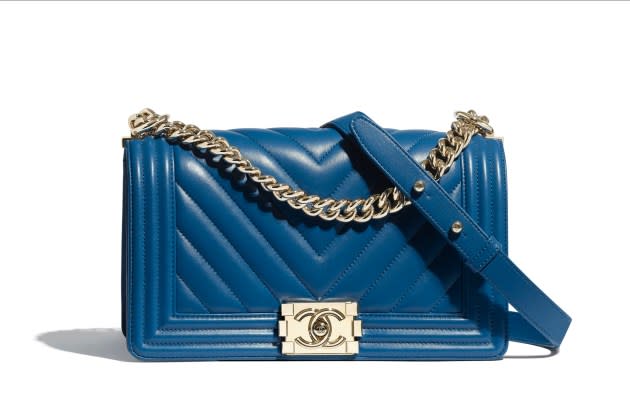Chanel and What Goes Around Comes Around Trial Takes an Unexpected Turn

The court battle between Chanel and What Goes Around Comes Around in New York federal court took an unexpected turn Wednesday, when the presiding judge dismissed two claims from his summary judgment ruling earlier this year.
Chanel first filed a lawsuit against the New York-based resale company in March 2018, alleging that there appeared to be an affiliation between the two fashion resources that did not exist and that Chanel had authenticated the pre-owned items sold at WGACA. The years-long dispute finally went to trial in a New York federal court a few weeks ago with both sides disputing trademark infringement, false advertising, claims of counterfeit goods and other issues.
More from WWD
ACS Partners With Archive to Pioneer Resale Channels for The North Face, Pangaia
Fashion for Good Museum Unveils Its Final Exhibition, Plans Expanded Coworking Space
After WGACA’s cofounder Seth Weisser wrapped up his testimony and his legal team declined to cross examine him, the plaintiff’s legal team rested their evidence. Following the jury’s dismissal for the day, an attorney for WGACA, Daniel DeCarlo, a partner at Lewis Brisbois, asked Justice Lewis Stanton to dismiss two components from his summer pre-trial summary judgment. The first was that the court had ruled that 11 of the items that bore the serial numbers that were among the ones that had been stolen from a Milan factory were as a matter of law infringing because they had not gone through Chanel’s quality control process. The second was related to 779 items that Chanel’s testimony stated were not given away or sold, and subsequently constituted infringing.
After nearly an hour of debate between the two sides, Stanton determined that decisions on all of those motions are reserved, and the statements in the summary judgment motion are suspended and to be either vacated or affirmed by the outcome of the jury trial.
DeCarlo argued that the allegations of WGACA having sold counterfeit goods was disproven in the court, after Chanel’s executive operations director Joseph Bravo recounted his prior testimony that had falsely claimed that a zipper on a Chanel handbag imprinted with the zipper manufacturer’s name Lampo was not genuine. DeCarlo suggested that there was no proof that the handbag had not gone through Chanel’s quality control process, which one of Chanel’s attorneys disputed multiple times in response.
The WGACA legal team also challenged Chanel’s suggestion that 779 (non-fashion) items that it sold such as mirrors, tissue boxes and trays were items that are never given away or sold, and constituted infringement. Chanel’s lawyers repeatedly said that those items had not been authenticated for sale.
DeCarlo also argued that the proceedings had proven that 11 Chanel handbags that carried serial numbers that were among the 30,000 serial numbers that had been stolen from the Corti Renato factory in Milan in 2012, and were later sold by WGACA, were in fact made in the Renato factory. Chanel’s legal team that is being led by Sheppard Mullin partner Theodore Max countered there was no evidence that those goods had ever been sold by Chanel or had come from a Chanel factory.
Both sides clashed multiple times during Wednesday’s proceedings over the nexus of the trial, with Chanel’s lawyers emphasizing the trial was about serial numbers and the WGACA’s attorney and cofounder Seth insisting it was about bags being genuine or real.
Earlier in the afternoon Weisser was asked about WGACA’s four-part authentication process, which typically takes 10 to 20 minutes per item and does not reference who authenticates individual goods or include photos of individual items. He also said the reason WGACA had not complied with 2015 Chanel’s request in a cease-and-desist letter to take photographs of individual items to post on the resale site — versus the style models that are featured — was due to “the cost of that outweighed the benefit.” Weisser said a few times that Bravo’s testimony had disproved any claims of WGACA selling counterfeit products. He also stood by the resale specialist’s claim that there had been a typo made during data entry of one of the bags in question.
After Wednesday’s unexpected suspension of the two claims, which will now be affirmed or dismissed based on the jury’s verdict, Chanel’s in-house lead counsel Robin Gruber told WWD, “Chanel believes that we have put on a strong case. If the court’s decision is one we don’t agree with, we will bring it to an appeal.”
At the conclusion Wednesday, Stanton also raised the question of the definition of “vintage,” a term that has surfaced throughout the court battle. After looking in a legal dictionary and a “huge” Merriam-Webster dictionary, the justice said, “They are not conclusive,” with the legal dictionary not having any specific legal definition and the Webster one referencing samples of the use of the word. “The only conclusion that I can draw on present knowledge is there is no legal definition of that word,” adding that the Federal Trade Commission’s definition references back to one of its own earlier articles, “which is too narrow a support to draw much faith, and nothing has been heard of it since.”
Stanton said, “So it may be an open field, and if the word itself has no legal definition then the question that is raised is, ‘How can you state a claim for a violation of it or a particular use or nonuse of it?’ But I leave that to the cooler heads that I’m looking at now. And it’s not a major point, but analytically it’s one that might reduce your reliance on the arguments about vintage.”
Best of WWD
